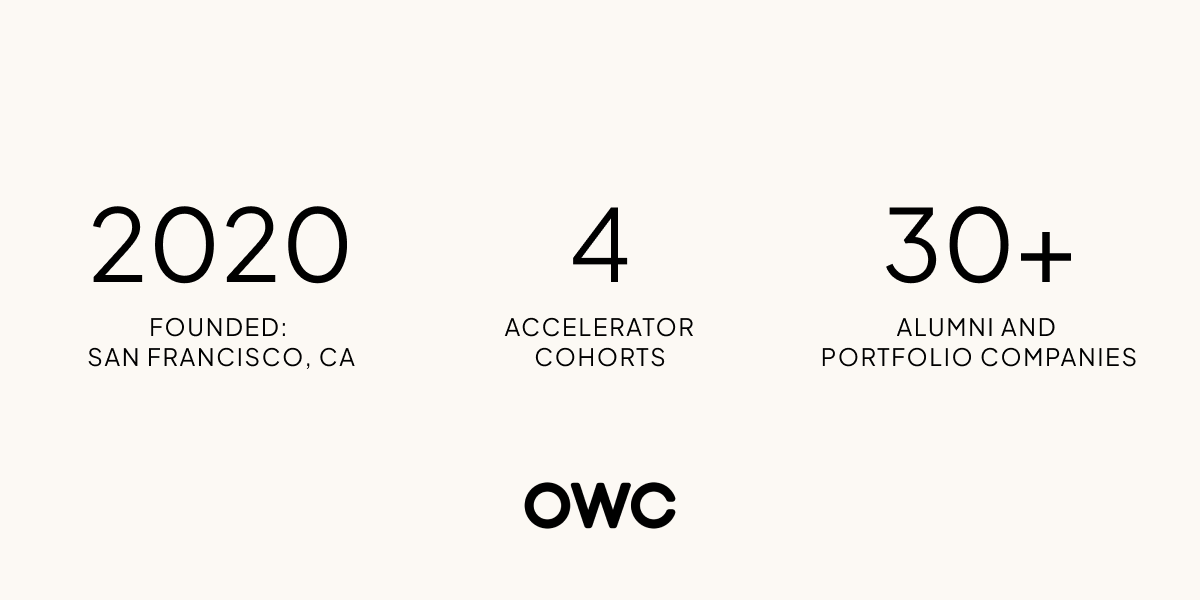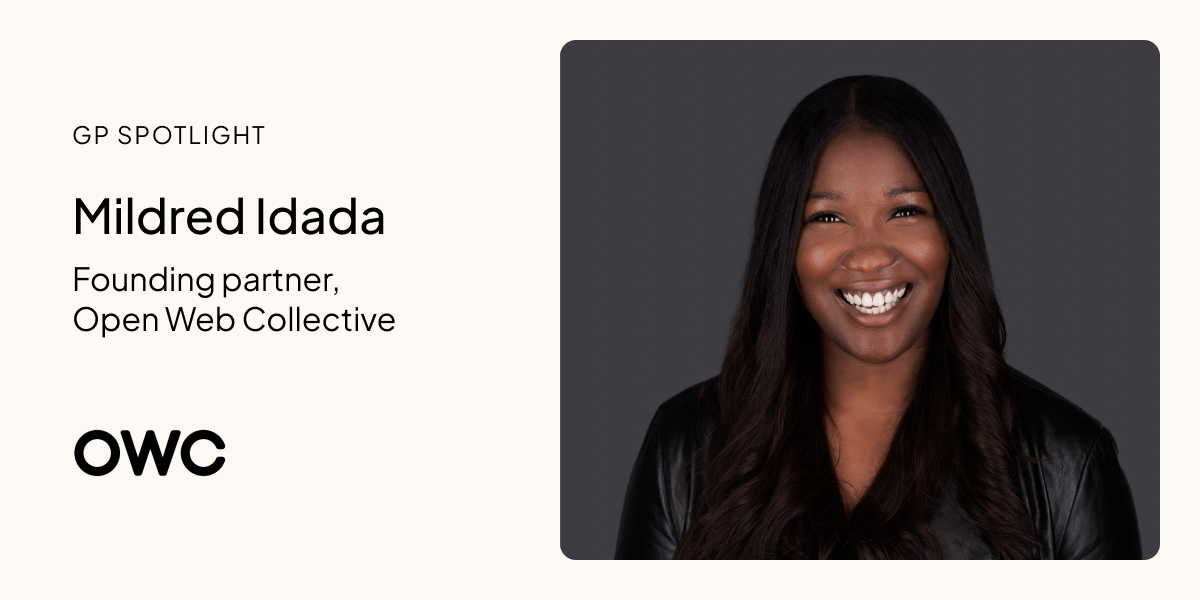Before she took the plunge into crypto and Web3, Mildred “Mimi” Idada worked in private equity, where her work focused on the technology industry. Researching the high-tech product and investment landscape eventually led her to the rapidly growing crypto subsector.
Mimi moved to San Francisco in 2020 and joined NEAR Protocol, a tech company operating a high-performance blockchain. While at NEAR, Mimi founded and led Open Web Collective (OWC), NEAR Protocol’s venture division.
As of 2022, OWC operates as a stand-alone entity making independent and financially driven investment decisions. The team is more than 50% women and includes crypto natives, fund of funds veterans, legal experts, and teammates with traditional venture experience. OWC’s in-house accelerator has supported more than 30 blockchain startups that have cumulatively raised over $360 million. In September 2022, the firm launched OWC Ventures.
We spoke with Mimi to get an insider’s take on the state of crypto investment, crypto regulation, and what it’s like to be a woman of color in crypto.

Nigeria: Could you tell us a little bit more about your investment strategy?
Mimi: Our thesis is focused on cryptocurrency and blockchain technologies as the underpinnings of a new wave of the internet. We invest at the earliest stages: pre-seed to Series A. Some of that work and deployment at the pre-seed stage is done through our in-house accelerator program, which provides support to early builders. Our seed-to-Series A deployment is usually done alongside leading crypto investors.
Nigeria: Do you invest in all the companies in your accelerator?
Mimi: Absolutely. We offer a standard deal of $150K for 7% of equity—or tokens.
These teams are early; there usually aren’t that many metrics, and they have limited traction. But there are key things that we look for when we invest and accept a team into the program.
The teams we bring on are usually technical founders with a good product, building in a large market. Our goal with the accelerator is to validate, build, and de-risk their ventures by defining and growing KPIs, developing product-market fit, and helping founders with community building and fundraising.
We often look for people who are past a prototype and at a minimum viable product. They’ve made some quantifiable progress and have been building for a little while. Ideally they have spent some time demonstrating early traction or gathering data points to validate or invalidate core assumptions.
We look to see if a team has a market-first approach to entrepreneurship. We’re looking for teams who are thinking about the next disruptive solutions but also about their end user—the ones today and the next million.
Nigeria: What makes blockchain attractive to LPs?
Mimi: Crypto is a great asset in institutional portfolios because of the high potential returns, low correlation to other assets, and liquidity.
We’re seeing more institutions move away from just holding Bitcoin. Bitcoin has a very specific role in the crypto market as digital gold. More allocators are keen to get exposure to protocols and blockchain tokens. Many people, including myself, believe crypto has broader applications and represents ownership in the next wave of tech startups.
Nigeria: Do you think LPs need to understand crypto and blockchain in order to invest?
Mimi: In general, you shouldn’t invest in anything you don’t understand. Retail investors and institutions ultimately need to derive an investment strategy that makes sense for their portfolio, their risk/reward appetite, and their operational capabilities. LPs need to understand the market they want to get exposure to, and determine the level of volatility and technical complexity they’re comfortable with. Then they can build their portfolio accordingly.
Nigeria:What types of tools and benchmarks should blockchain investors be able to access more easily?
Mimi:Crypto investing is moving to mobile. Retail investors already have access to Coinbase and MetaMask, and Solana has a suite of apps because they understand that most people invest on their phones. Crypto-native investing tools and neo-banks are catching up and becoming essential for investors.
Investors also need data on mobile. A lot of the benchmarks and crypto market information available is dependent on the wallet you use and its ability to buy tokens and understand what’s happening with your portfolio.
Nigeria:More crypto regulation is widely expected. What specific challenges or advantages come with being an emerging manager in this sector, given that it’s so new, and also vulnerable to sweeping regulatory changes?
Mimi: People often think that if you’re in the crypto and blockchain industry you’re anti-regulation—but that could not be further from the truth for all of us at OWC. Overall, we believe crypto regulation can be a net positive for the industry if it does not impede innovation or the technology’s potential. Regulation is helpful for thinking about how we mitigate bad actors and use technologies best. It can also help institutions get a bit more comfortable with interacting with digital assets and cryptocurrency.
[SEC Chair] Gary Gensler’s recent speeches highlight how the SEC will not warm to tokens or cryptocurrency without Congress mandating that they do so. As crypto gains more adoption, we should expect more congressional attention and regulation.
Nigeria: What is it like to be a woman of color working in blockchain technology?
Mimi:We all know that there’s a diversity issue in technology—and more specifically, racial and gender gaps. There’s a strong focus in this space on social justice issues and grassroot action and empowerment. We see individuals spinning up DAOs to support communities and initiatives they’re a part of all the time—for example, there’s Unchained Fund, a DAO supporting Ukraine.
I’m a part of a number of similar initiatives to support and invest in women and nonbinary people. One is she256: It focuses on career development and investment. Another is Komorebi Collective, a DAO that invests in folks who are building blockchain and digital asset solutions. Traditionally it took a large institution to make these changes. With Web3, it’s a group of people. You and I can get together and decide to make that change. So as a woman of color in this space, I feel empowered—and the individuals around me are excited to support the missions they align with. That’s rare and makes this a unique space.
Nigeria:Should decentralized ownership and currencies be made more accessible to diverse communities? And if so, how can this be done?
Mimi:Absolutely. With cryptocurrency and Web3 applications, we’re redefining what ownership means and who gets access to it. And if we’re not including marginalized and underrepresented communities—the folks who haven’t had the opportunity to get that access, be a part of the building, and be a part of the wealth generation—then we are doing everything wrong. It is so important that we bring marginalized groups into all levels of this. I mean hiring, building startups, getting funded, being a part of these early protocols, being part of retail, and understanding financial literacy for Web3. Teams need to think about that as they’re building.
Our community reach is also important. Are we going to places like Nigeria and Kenya to teach about blockchain technology and share how it might help with remittance? Are we going to countries in South America with hyperinflation and showing how stablecoin currency could help? It’s important that we bring marginalized groups along: It’s a part of how we solve for what’s not yet been solved for.
